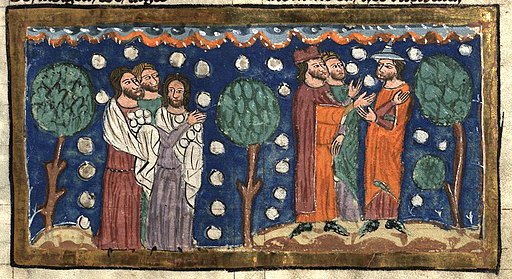Free Resource: Praise Beats Complaints (Youth)
Unit Theme (Sept. 10 – October 8): God Provides Blessings

Our first series of texts in the Year 4 Narrative Lectionary moves through the theme of “God Provides Blessings” in our Living the Word faith formation resources. Last week, God called Moses to deliver Israel from the hand of their oppressor, despite Moses’ fear and excuses. This week we have moved through the ten plagues and the crossing of the Red Sea, to a time when the people are being led to Mount Sinai to receive their instructions on how to live as a free people. As human nature often does in times of difficulty, the people are complaining about what they don’t have.
In the story this week from Exodus 16, the people of Israel, whom God had delivered from slavery through dramatic, impossible wonders, are complaining. Again.
At the end of chapter 15, just prior to this, the people complained to Moses about not having enough to drink, and the water they did find (a spring, river, or lake?) was undrinkable. God provided clean water for the people by directing Moses to toss a piece of wood into the water and suddenly the water was good to drink.
After a month and a half of traveling, the people began complaining about the lack of food. The text doesn’t say one way or the other, but I have a hard time believing that the people were fasting for around 45 days. If so, the complaining would have started a long time before that. But, with thousands of Israelites making the march, it isn’t hard to believe that food would be scarce.
Within this account, seeing and experiencing what they have, the Israelites should have just prayed to God for food, trusting that God would provide for them. But, that’s not human nature. We quickly forget our blessings and focus on the negative, especially in times of suffering. They complained. Can we really blame them? We would have done the same thing in their place. And, despite the lack of trust, God did provide the people with enough food to go on.
What I think is humorous though, is the reminiscing on the “good old days.” You know, the time when they were slaves, beaten and mistreated by their owners. Yes, I’m sure that the Egyptians provided them food (you can’t starve your workforce and expect them to work hard), but I’m also sure that the slaves didn’t get the best food, or even a large amount of it. Their memories, like ours, can be selective, focusing on the good, or the bad, when reality was a mix of both.
So, how can we approach this text in our various faith formation contexts?
- Act It Out: This is a standard, tried and true approach that engages both actors and audience, of all ages. It can be as simple as having a narrator read the Bible text while a group improvises actions to go along with the story. Or, a script can be created (or found) that dramatizes the story, or even modernizes it.
- Audience Participation: Do you want to get the whole group involved? Come up with some simple actions (silent or loud; sitting, standing, or moving) that a whole group can perform when certain cues are read in the story.
- Eat It Up: Encourage multiple sensory experiences by providing “manna” of your own to eat. A recipe can be found online that you can make as a group or ahead of time, or you can just use crackers! As any time food is used in a group, please be sensitive to food allergies and intolerances and provide an alternative.
In general, participants benefit when faith formation activities use multiple senses, movement, and interaction.
May your planning this week be fruitful!
-Gregory Rawn (Publisher)
This week’s FREE resource is a “Living the Story” activity from our middle and high school curriculum, Living the Word: Youth, which includes weekly lessons following the texts of the Narrative Lectionary and can be used in a youth Sunday school, confirmation class, or youth group. Each lesson covers a wide variety of learning and teaching styles, with standard components like Hands On, Mixed Media, Competitive Edge, Simply Serving, and Worship Connection, as additional activities to the core Bible study and faith practice.

Leave a Reply